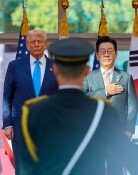Weakening Won Accelerates Price Increases
Weakening Won Accelerates Price Increases
Posted March. 12, 2008 08:10,
Amid inflation, the won has sharply depreciated.
Rising consumer prices and increasing foreign exchange rate have the same effect on the economy since both cause the value of money to fall. Thats why a rising foreign exchange rate accelerates the pace of price increase. The recent increase in consumer prices has dealt a serious blow to low-income brackets since it has raised the price of essential goods including groceries. However, the government announced that it would not adopt new policies to stabilize the foreign exchange rate since a rising foreign exchange rate contributes to export growth, thus improving the current account balance. By deciding to put a higher priority on improving the current account balance over economic growth, the government seems to be supporting exporters even when its decision clearly puts a burden on the low-income bracket.
○ Won-Dollar Exchange Rate Increases 33.50 Won for Eight Trading Days
In the Seoul foreign exchange market, the won-dollar exchange rate surged 4.70 won to close at 970 won per dollar, yesterday. At one point, the rate had even soared to 980.60 won per dollar during the day. After the dollar traded at 936.50 won in February 28, the won-dollar exchange rate has soared 33.50 won for eight trading days. It has exceeded the 970 won per dollar mark, the first time in 23 months since April 3, 2006 when the dollar was trading at 970.8 won.
The won has decreased against the dollar by 3.41 percent from January 2 to March 10, 2008. In contrast, the Japanese yen has increased 9.97 percent and the euro jumped 5.06 percent against the dollar over the same period. Currencies of other economies including Singapore, Hong Kong, and Taiwan have risen, as well.
Even though the currencies of other nations have appreciated against the dollar, as the dollar has sharply depreciated due to the subprime mortgage loan crisis, economic slowdown, and rate cut in the U.S., the won has sharply depreciated against the dollar.
The reason behind the wons unexpected weakening is dollar outflow.
High international oil prices have accelerated dollar outflow from Korea. Also, the demand for dollars has increased since foreign investors have sold Korean stocks which have presented them with huge profits. These have, in turn, been converted into dollar to return money to individual investors who may want to redeem their investments. As of Mar. 10, foreign investors net selling has reached 12.2 trillion won since the beginning of this year.
Some experts explain that the won is now going through a correction phase since it increased against the dollar more dramatically than any other currencies. Indeed, it has jumped 45 percent against the dollar from January 2002 to late October 2007. Over the same period, the Japanese yen increased 14.5 percent and the Taiwanese dollar grew a mere 8 percent.
Most experts predict that the dollar-won exchange rate will continuously increase until April when foreign investors are expected to exchange their dividends for dollars and remit the money. Firms listed on the KOSPI are estimated to pay dividends of 4.9 trillion won to foreign investors.
○ Current Account Balance versus Price Stability
Weakening of the won means Korean firms, which have heavily depended on imports of raw materials, will have to pay more.
At the same time, however, the weakening won improves the current account balance since it strengthens export competitiveness and discourages consumers from spending on luxurious goods. The government is in a difficult situation as it needs to choose to either stabilize consumer prices or improve the current account balance. Given recent statements of high-ranking government officials, Strategy and Finance Minister Kang Man-soo seemed to have chosen improving the current account balance over reducing price uncertainties. The minister is known to believe that leaving the current account deficit unchecked could dry up the nations wealth.
A source with the ministry said, When he was the vice minister of the Finance and Economy Ministry, the government stuck to the policy to strengthen the won in an effort to raise the nations per-capital income to the $10,000 mark. The policy resulted in snowballing the current account deficit. He still remembers the bitter reality the nation faced when it was hit the hardest by the financial crisis due to its current account deficit.
Given this years current account deficit is expected to reach $7 billion, the government is unlikely to be able to stabilize consumer prices through its foreign exchange policies.
A high-ranking official at the ministry said, What decision makers, including Minister Kang in charge of foreign exchange policy, have in common is a belief that the government should not intervene in the foreign exchange market even when it wants to stabilize prices.
However, recent price hikes have put a heavy burden on low-income earners as the cost of necessaries including flour and processed food have risen. Lee Gwang-wu, a senior researcher at LG Economic Research Institute, said, The foreign exchange rate will consistently put inflationary pressure on consumer prices for the time being. The government will now be more pressured to change its current foreign exchange policy.







